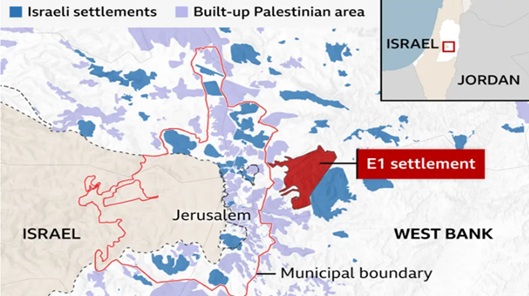| (Mains Exam, General Studies Paper- 2: Impact of policies and politics of developed and developing countries on India's interests; Overseas Indians) |
Context
Israel's approval of the expansion of the 'E1 Settlement Plan' on the occupied West Bank has drawn strong reactions from various countries, given its implications on the two-state solution and the Middle East peace process.
What is the 'E1 Settlement Plan'

- Under this, thousands of new housing units have been approved in the West Bank areas under Israeli control since 1967.
- It will connect Israeli-occupied East Jerusalem with the existing Israeli settlement of Maale Adumim.
- According to Israeli Finance Minister Smotrich, this plan is being revived in response to other countries recognizing the Palestinian state.
- Palestine and international bodies consider these settlements illegal under international law (particularly the Fourth Geneva Convention).
- Israel justifies them on the grounds of ‘security’ and ‘historic rights’.
Global reactions
Palestine
- Palestine considers the E1 settlement plan an extension of plans that undermine the geographical and demographic unity and undermine the opportunity to establish a Palestinian state in its homeland.
- Declaring the settlements ‘invalid’, Palestine has warned of increased tensions and possible unrest in the region.
Qatar
- Qatar’s Foreign Ministry condemned the move, reaffirming its clear rejection of Israeli occupation policies.
- According to Qatar, the plan aims to expand settlements and forcibly displace Palestinians, which are measures taken to prevent the establishment of a Palestinian state.
Saudi Arabia
- Saudi Arabia's Foreign Ministry has 'strongly' condemned the settlement plan, calling it a violation of international law and a serious threat to the possibility of a two-state solution.
- It called on the international community to fulfill its legal and moral responsibilities, protect the Palestinian people and fulfill their legitimate rights, including the recognition of the Palestinian state.
Jordan
- Jordan has condemned the settlement plan and Israel's illegal measures. According to it, this is a violation of international law and International Security Council resolutions.
- It warned against the Israeli government's continued expansionist policy in the West Bank, saying that it promotes violence and conflict in the region.
Turkey
- According to Turkey's Foreign Ministry, this plan violates international law and UN resolutions as well as disrupts the territorial integrity of the State of Palestine, the basis of a two-state solution and lasting peace.
- It reaffirmed Turkey's support for an independent Palestinian state based on the 1967 borders, with East Jerusalem as its capital.
United Kingdom
- The UK strongly opposes the Israeli government's E1 settlement, which would split the future Palestinian state in two. It is a gross violation of international law.
Germany
- The German government, a strong supporter of Israel, has declared its 'complete rejection' of the new development plan, urging Israel to stop the E1 settlement plan.
- According to the Berlin-based Foreign Office, the construction of settlements violates international law and relevant UN Security Council resolutions.
- It complicates the negotiated two-state solution and the end of Israel's occupation of the West Bank, as demanded by the International Court of Justice.
Spain
- Spanish Foreign Minister Jose Manuel Alberes called the expansion plan a violation of 'international law'. According to them, this undermines the viability of the 'two-state solution', the only path to peace.
United Nations
- The United Nations has called Israel's move a violation of international law and a major obstacle to peace.
- It warned against changing the demographic and geographical nature of Palestinian land.
- The United Nations urged Israel to withdraw its decision. According to it, this plan will end the possibilities of a two-state solution.
United States
- Israel's major ally, America, has not immediately criticized this proposal.
- The US intervention is focused on ending the war in Gaza and ensuring that Hamas can never rule that area again.
- A stable West Bank keeps Israel safe and is in line with this administration's goal of establishing peace in the region.
European Union
- The European Union expressed strong opposition and reiterated support for a viable Palestinian state alongside Israel.
- Some EU countries are also considering diplomatic protests and economic measures.Arab world and Organization of Islamic Cooperation
- Condemned the plan as an act of 'annexation'.
- Called for international intervention to protect Palestinian rights.
India's stand
- India has consistently supported a two-state solution through negotiations.
- In this, Israel and Palestine live together within secure and recognized borders and East Jerusalem is the capital of Palestine.
- India has expressed concern that unilateral settlement expansion, including the E1 plan, undermines the prospects for peace.
- In the UN General Assembly and UN Security Council, India has generally voted in support of resolutions criticising illegal settlements. At the same time, it has maintained balanced diplomatic relations with Israel.
- India insists that dialogue and diplomacy are the only sustainable way forward.
- India avoids taking extreme positions to maintain its credibility with both sides.
Implications
- Israel’s plan further weakens the already fragile framework of the Oslo Accords.
- It is likely to increase tensions in West Asia and increase the risk of violence.
- It will reduce global confidence in the Israel-Palestine peace talks.
- It will lead to regional instability amid the Gaza conflict and Iran-Israel tensions.

 Contact Us
Contact Us  New Batch : 9555124124/ 7428085757
New Batch : 9555124124/ 7428085757  Tech Support : 9555124124/ 7428085757
Tech Support : 9555124124/ 7428085757








